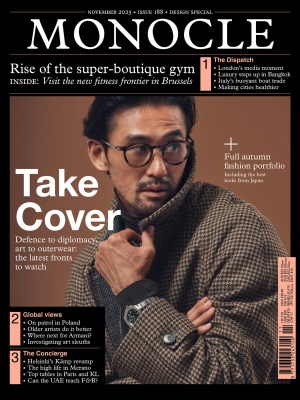
Issue 149
Monocle’s December/January bumper issue will take you to the far reaches of the globe, from poring over design details in Uzbekistan to petting mountain rescue dogs in Alaska. Alongside our annual Soft Power Survey, we get the local view on Libya a decade on from Gaddafi’s fall and catch up with the president of Costa Rica at Cop26. We also take a drive around Detroit’s art scene and see why Lithuania’s second city is luring film scouts.
In This Issue
Oops! No content was found.
Looks like we no longer have content for the page you're on. Perhaps try a search?
Return Home

